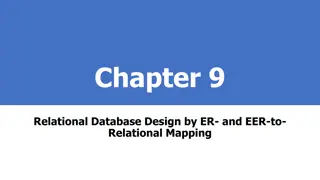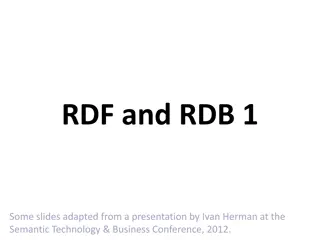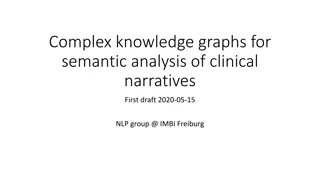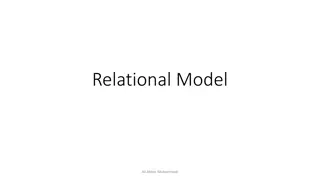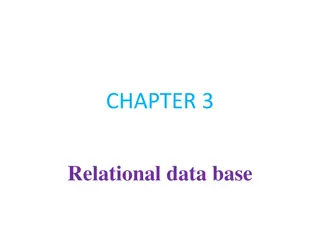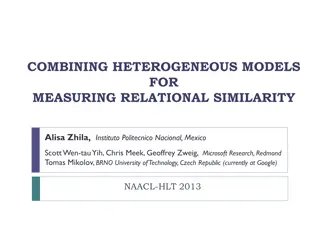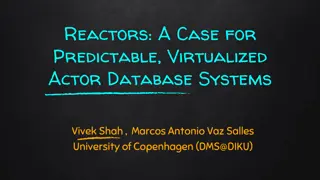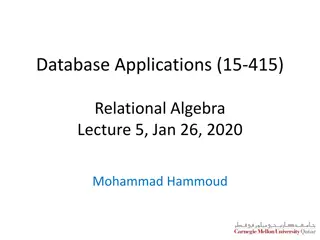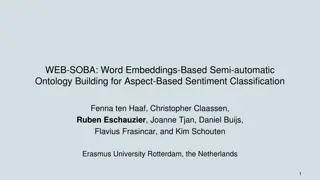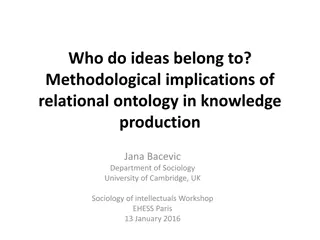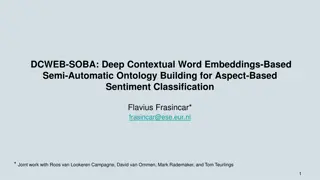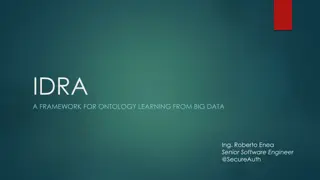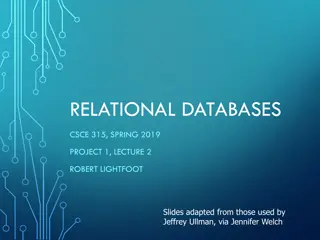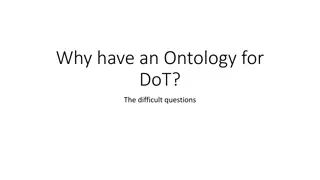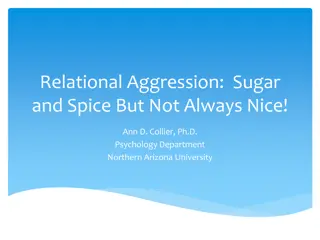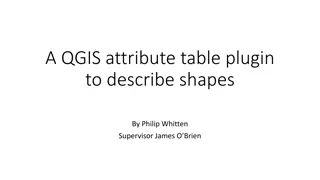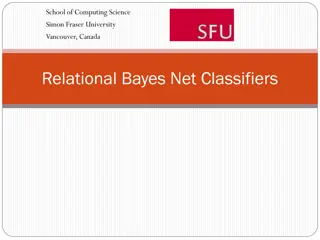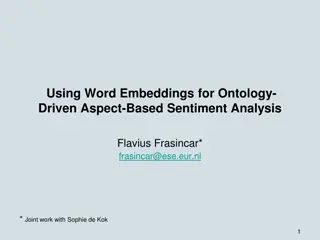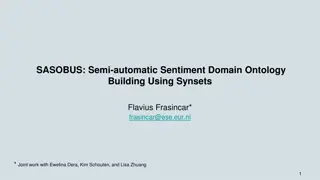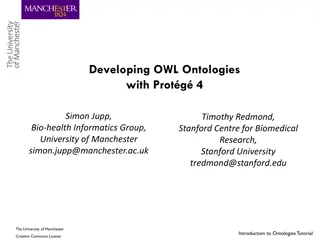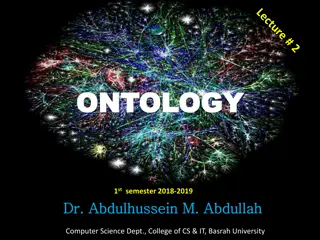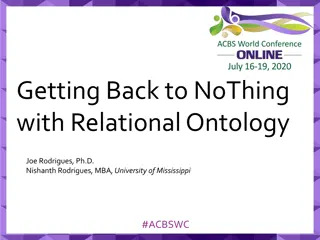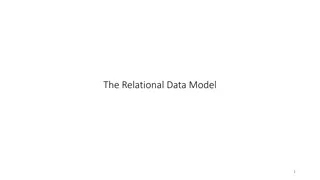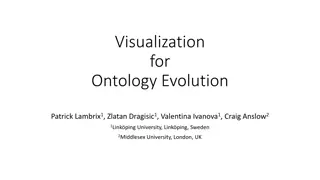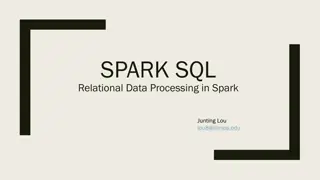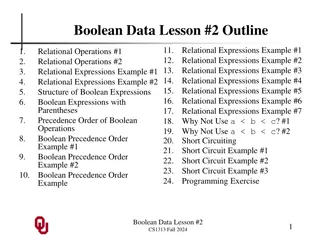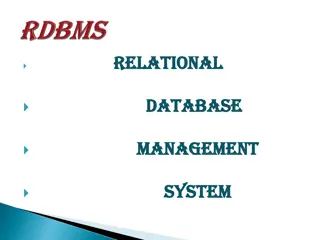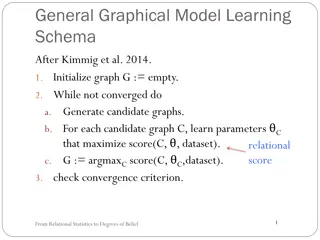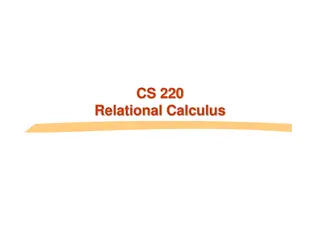Progressive Approach to Relational Entity Resolution
In this research paper authored by Yasser Altowim, Dmitri Kalashnikov, and Sharad Mehrotra, a progressive approach to relational entity resolution is presented. The study focuses on balancing cost and quality in entity resolution tasks for relational datasets. The goal is to develop a method that ac
1 views • 20 slides
Understanding Relational Database Design and Mapping Techniques
Explore the process of mapping Entity-Relationship (ER) and Enhanced Entity-Relationship (EER) models to relational databases. Learn about relational model concepts, mapping algorithms, and the goals and steps involved in the mapping process. Discover how to preserve information, maintain constraint
3 views • 42 slides
Understanding Enduring Relational Themes in Psychotherapy
Exploring the concept of Enduring Relational Themes (ERTs) in psychotherapy, this content delves into the history of transference in Gestalt therapy, contemporary psychoanalysis perspectives, forms of transference, and Lynne Jacobs' insights. It highlights how ERTs manifest, their impact on therapy,
5 views • 9 slides
Exporting Relational Data to RDF: Strategies and Considerations
Explore the process of mapping relational data to RDF, including the choice of RDF vocabulary, defining mapping techniques, and exporting strategies. Learn about RDB systems that support RDF, direct mapping approaches, and the use of hybrid storage solutions. Discover how to bridge SPARQL and SQL fo
1 views • 13 slides
Semantic Analysis of Clinical Narratives Using Complex Knowledge Graphs
Need for improved semantic analysis of clinical narratives for information retrieval and decision support is addressed through the use of complex knowledge graphs. These graphs capture axiomatic descriptions of generalizable truths about entities in the medical domain, providing a language-independe
0 views • 8 slides
Understanding the Key Concepts of Relational Databases
Introduction to the fundamental concepts of relational databases including the relational model proposed by Edgar F. Codd, relation schemes, relation instances, keys for a relation, and more. Discover the significance of keys, candidate keys, superkeys, and primary keys in database design.
0 views • 27 slides
Understanding Relational Databases and File-Based Systems
This chapter delves into the fundamental concepts of databases, comparing them to file-based systems, and highlighting the significance of relational databases in modern integrated AISs. It explores the difference between logical and physical views of databases, introduces key concepts such as DBMS
0 views • 70 slides
Enhancing Relational Similarity Measurements: A Model Combination Approach
This study explores combining heterogeneous models for measuring relational similarity, showcasing the importance of general relational similarity models. It discusses the degrees of relational similarity and introduces a directional similarity model that outperforms previous systems. The approach l
0 views • 23 slides
Reactor: A Case for Predictable, Virtualized Actor Database Systems
Exploring the integration of actor programming models in modern relational databases to achieve high performance. The focus is on addressing challenges related to stored procedures, data partitioning, modularity, isolation, software engineering, and performance. The talk outlines motivation, the rel
0 views • 41 slides
Understanding Relational Query Languages in Database Applications
In this lecture, Mohammad Hammoud discusses the importance of relational query languages (QLs) in manipulating and retrieving data in databases. He covers the strong formal foundation of QLs, their distinction from programming languages, and their effectiveness for accessing large datasets. The sess
0 views • 39 slides
WEB-SOBA: Ontology Building for Aspect-Based Sentiment Classification
This study introduces WEB-SOBA, a method for semi-automatically building ontologies using word embeddings for aspect-based sentiment analysis. With the growing importance of online reviews, the focus is on sentiment mining to extract insights from consumer feedback. The motivation behind the researc
2 views • 35 slides
Challenges and Innovations in Relational Engine Algorithms
Exploring the complexity of processing graph data in relational query engines, this content delves into the challenges faced, practices adopted in academia, and innovative solutions like LMS-NPRR, trie join, and specialized data structures. It discusses the difficulties in handling acyclic vs. cycli
0 views • 27 slides
Understanding Relational Ontology and Knowledge Production in Sociology
This academic exploration delves into the concept of relational ontology and its methodological implications in knowledge production, focusing on the ownership of ideas and the role of intellectuals as knowledge producers. It discusses the foundational singularity, the generative significance of con
0 views • 12 slides
Semi-Automatic Ontology Building for Aspect-Based Sentiment Classification
Growing importance of online reviews highlights the need for automation in sentiment mining. Aspect-Based Sentiment Analysis (ABSA) focuses on detecting sentiments expressed in product reviews, with a specific emphasis on sentence-level analysis. The proposed approach, Deep Contextual Word Embedding
0 views • 34 slides
Understanding Relational Evangelism and Sharing Your Faith Testimony
Discover the essence of relational evangelism and effectively articulating your testimony of faith. Explore the significance of the Gospel message and different evangelistic approaches while delving into the concept of personal evangelism without imposition. Embrace the idea of faith arising in vari
0 views • 32 slides
Framework for Ontology Learning from Big Data with IDRA
IDRA (Inductive Deductive Reasoning Architecture) presents a comprehensive framework for ontology learning, focusing on data modeling and architecture components. ETL (Extract Transform Load) processes play a vital role in semantic enhancement of data, especially in identity and access governance co
0 views • 25 slides
Fundamentals of Relational Databases in CSCE 315 - Lecture Highlights
Introduction to relational databases covering topics such as relational data model, schemas, converting from entity-relationship model, entity sets, relations, relationships, combining relations, and practical examples. Learn about storing data in tables, attributes, database organization, and the i
1 views • 18 slides
Importance of Ontology in System Development for DoT
Ontology plays a crucial role in the development of systems for DoT by facilitating the automation of tasks, improving consistency, and enhancing the efficiency of tool chains. It enables the transformation of semantic descriptions into algorithms, streamlining processes and reducing the need for ma
0 views • 7 slides
Understanding Relational Aggression in Girls: The Impact on Social Relationships
Relational aggression, a form of social bullying, can have detrimental effects on girls' social relationships and self-esteem. This type of indirect aggression includes behaviors like exclusion, spreading rumors, and social manipulation. Understanding and assessing relational aggression is crucial f
0 views • 22 slides
Enhancing Spatial Data Analysis in QGIS
Explore the integration of relational databases with QGIS to facilitate efficient spatial data analysis. Discover the importance of recognizing spatial relationships within data sets and the solutions to enhance QGIS for relational datasets. Overcome challenges and delve into the intersection and su
0 views • 25 slides
Understanding Relational Bayesian Networks in Statistical Inference
Relational Bayesian networks play a crucial role in predicting ground facts and frequencies in complex relational data. Through first-order and ground probabilities, these networks provide insights into individual cases and categories. Learning Bayesian networks for such data involves exploring diff
0 views • 46 slides
Using Word Embeddings for Ontology-Driven Aspect-Based Sentiment Analysis
Motivated by the increasing number of online product reviews, this research explores automation in sentiment mining through Aspect-Based Sentiment Analysis (ABSA). The focus is on sentiment detection for aspects at the review level, using a hybrid approach that combines ontology-based reasoning and
0 views • 26 slides
BabyDayOut Ontology: Describing Picture with Classes, Instances, and Relations
Ontology "BabyDayOut" is developed using RDF/RDFS to describe a picture. It includes classes such as Person, Animal, Baby, Picture, Man, and Gorilla with instances like John, KingKong, Jack, Peter, and Alex. Various relations like hasFriend, hasAnimalFriend, sonOf, depicts, hasEnemy, and hasTitle ar
0 views • 9 slides
SASOBUS: Semi-Automatic Sentiment Domain Ontology Building Using Synsets
Building on the need for automation due to the increasing volume and significance of online reviews, SASOBUS focuses on Aspect-Based Sentiment Analysis (ABSA). The motivation behind SASOBUS lies in the growth of sentiment mining for product reviews, particularly at the sentence level. Its approach i
0 views • 36 slides
Understanding Web Ontology Language (OWL) in a Nutshell
Web Ontology Language (OWL) is a powerful tool for ontology modeling, allowing the creation of complex structures and relationships. OWL encompasses entities, expressions, and properties, enabling detailed descriptions of domains through axioms. The language supports both object and data properties,
0 views • 39 slides
Introduction to Developing OWL Ontologies with Protégé 4
Explore the world of developing OWL ontologies with Protégé 4 through a comprehensive tutorial by Simon Jupp and Timothy Redmond from Stanford Centre for Biomedical Research and the University of Manchester. Learn about OWL introduction, Protégé 4 interface, compositional approach, and the signi
0 views • 44 slides
Introduction to Ontology in Computer Science
Ontology is the study of existence, with applications in various fields like philosophy, linguistics, and computer science. In computer science, an ontology is an engineering artifact that defines a specific vocabulary to describe a domain, along with explicit assumptions about the vocabulary's inte
0 views • 33 slides
Ontology Quiz: Test Your Knowledge on Computational Logic and Philosophy
Delve into the world of ontology with this quiz featuring questions on computational complexity, mereology, standardization of OWL, and foundational ontologies. Test your understanding on topics such as first-order predicate logic, parthood in mereology, and more. Challenge yourself and expand your
0 views • 45 slides
Exploring Relational Ontology and Its Philosophical Implications
Delve into the fascinating realm of relational ontology, where concepts like the nature of existence, the essence of things, and the interconnectedness of all are dissected. From traditional Western perspectives to Eastern philosophies, this exploration challenges conventional views on reality, emph
0 views • 16 slides
Understanding the Relational Data Model and Database Concepts
Delve into the world of relational data modeling, database integrity rules, and structure. Explore how a university database in MS Access utilizes relational tables and fields to store information. Learn about the key terminology associated with relational databases, such as primary keys, foreign ke
0 views • 69 slides
Women's Self-Esteem and Relationship Behavior Study: Insights and Implications
This study explores the relationship between women's self-esteem, relational behavior, and perceptions of relational desirability. Findings indicate that self-esteem does not significantly predict relational behavior, with women feeling less desirable than their partners reported investing more in r
0 views • 9 slides
Understanding Relational Child and Adolescent Psychotherapy
Explore the concepts of relational child and adolescent psychotherapy involving attachment patterns, intersubjectivity, corrective emotional experiences, and the role of the relational psychodynamic psychotherapist in providing corrective emotional experiences essential for the child's development.
0 views • 25 slides
Visualizing Ontology Evolution for Improved Knowledge Management
Ontologies are dynamic entities that evolve over time, impacting semantically-enabled applications and knowledge acquisition. This work focuses on identifying desired functionalities for ontology evolution systems, highlighting the steps involved in ontology evolution, and emphasizing the importance
0 views • 16 slides
Semantic Tool for Personal Information Protection
Semantic Tool for the Protection of Personal Information Act is a project led by Yahlieel Jafta, aiming to establish a knowledge base using ontology to assist individuals and organizations in interpreting the Act. The project focuses on the importance of ontologies in extending knowledge and enablin
0 views • 17 slides
Overview of Spark SQL: A Revolutionary Approach to Relational Data Processing
Spark SQL revolutionized relational data processing by tightly integrating relational and procedural paradigms through its declarative DataFrame API. It introduced the Catalyst optimizer, making it easier to add data sources and optimization rules. Previous attempts with MapReduce, Pig, Hive, and Dr
0 views • 29 slides
Understanding Relational Operations for Boolean Expressions
Learn about relational operations in Boolean expressions through examples and explanations. Discover how to compare numeric operands to produce Boolean results, covering equal to, not equal to, less than, less than or equal to, greater than, and greater than or equal to operations. The content inclu
0 views • 25 slides
Evolution of Database Management Systems
The evolution of Database Management Systems (DBMS) began with file systems and punched cards in the 1950s, followed by hierarchical and network models in the 1960s and 1970s. The 1980s introduced relational databases like Ingres, Oracle, DB2, and Sybase. The 1990s saw the rise of object-oriented an
0 views • 31 slides
Learning Bayesian Network Models from Complex Relational Data
Delve into the process of learning Bayesian network models from complex relational data, extending traditional algorithms to suit relational data structures. Explore key concepts like likelihood functions, graphical model initialization, and parameter learning for effective model fitting.
0 views • 20 slides
Introduction to Relational Calculus and Algebra in Database Management
Explore the fundamental concepts of relational calculus and algebra in the domain of database management. Understand the differences between declarative and imperative query languages and learn to retrieve information using practical examples and theoretical frameworks such as tuple relational calcu
0 views • 23 slides
Comprehensive Guide to Ontology Editors and IDEs for Ontologies
Explore a wide range of Ontology Editors and Integrated Development Environments (IDEs) for managing ontologies efficiently. From simple text editors to advanced IDEs like Protégé and Web Protege, learn about various tools and syntax options available. Dive into Ontology Editors like Protégé 4.3
0 views • 16 slides

